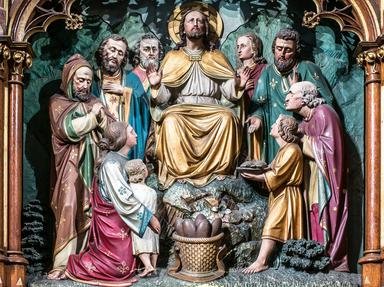Quiz Answer Key and Fun Facts
1. I was sent by the Lord to the city built by the mighty hunter Nimrod but I went reluctantly. In a terrible role reversal of the hunter becoming the hunted or more accurately the fisherman becoming the bait, I became human sushi. When I finally arrived to where I was sent, the people repented and I was displeased. Which grumpy prophet am I?
2. As a prophet of the Lord, my main opponent was this wicked king of Israel who shared his name with the title character of a novelty song who was described as the 'sheik of the burning sand' and who rode a camel named Clyde. His wicked wife shared the name of a character played by Bette Davis in a 1938 movie. When my time came to leave this earth you could say I 'sowed the wind' and therefore left in a most unusual way. Who am I?
3. As it is written, "Cast your bread upon the waters, for you will find it after many days," and so my mother did with my baby brother. He grew to be a great prophet and lawgiver and I became a great prophetess. In fact some place my cup next to that of Elijah during the Passover Seder. Do you know who I am?
4. Was it Eddie Murphy's voice I heard or maybe merely that of a Democrat? It doesn't really matter it was nonetheless miraculous. Maybe I am Dr. Doolittle after all and not merely a prophet? Hired to curse the Israelites, three times instead I pronounced blessings upon them because the Lord controlled what I could say. Have all of the 'numbers' lined up for you so you can tell who I am?
5. By the Lord's command I married a prostitute or was it Jim Nabors? Either one sounds ludicrous. I have been called the 'prophet of doom' because I preached to the Northern Kingdom about their eventual downfall as a result of their unfaithfulness. But I am also an example of God's undying love for His people and of the promise of restoration. Who am I?
6. "Curse God and die," came the cry of the one closest to me. "But why oh why," came my reply, "Would I do such a thing?" Hell on earth at the hands of the Adversary, a life of misery and pain. But in the end salvation came and my faithfulness was rewarded. Which prophet am I?
7. Iddo was my name and visions were my game. As such I became Iddo the ___. Can you fill in the blank with what people called me, a name that was given to many prophets?
8. As well as being a prophet, I was the last of the judges of Israel and many consider my mother to have been one of the seven prophetesses of the Old Testament/Tanakh. I anointed the first two kings of Israel. Was I the first Lazarus or was it a mere illusion? Only the witch of Endor and the Ewoks know and neither is talking. Do you know who I am?
9. I was considered one of the four great beauties of the Tanakh and one of the seven prophetesses. I stopped David from shedding blood in vengeance and prophesied about his future rise to the kingship. My speech to him is one of the longest recorded speeches by a woman in the Tanakh. I became his wife when my husband died by the hand of God instead of by David's hand. Who am I?
10. Sometimes it is scary to be a prophet, especially when you are sent to tell an otherwise righteous king about the grave sin he has committed. But perhaps I am best known as the namesake of 'famous' hot dogs and the eating contest held each year or as the namesake of one of the sons of this great king of Israel through whom the genealogy of Christ is traced in Luke. Surely you can identify me from these clues.
Source: Author
tazman6619
This quiz was reviewed by FunTrivia editor
CellarDoor before going online.
Any errors found in FunTrivia content are routinely corrected through our feedback system.

